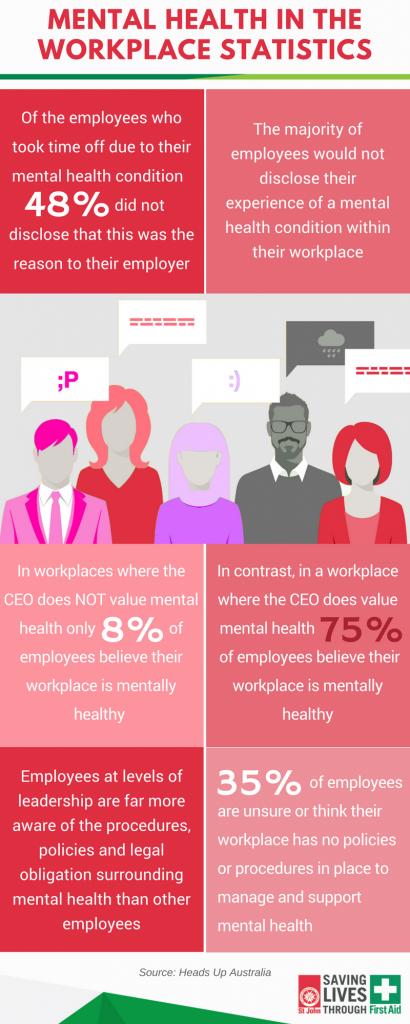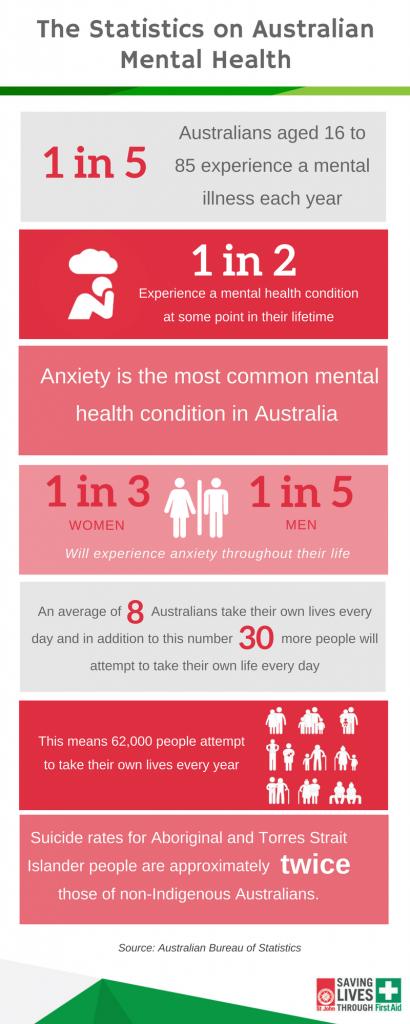7 Ways to Be Better Prepared for a Mental Health Crisis

R U OK? DAY is a national initiative which encourages Australians to ask their loved ones, colleagues and strangers alike an important yet simple question – ‘are you okay?’- with the intent of starting an honest conversation about mental health.
According to the Australian Bureau of Statistics 3.2 million Australians suffered from a mental disorder in a 12-month period. Recent research has exposed the harsh reality that with 1 in 5 Australians suffering from mood disorders such as depression and anxiety it’s more than likely that you know someone who is suffering and more commonly than not, they’re suffering in silence.
Depression and anxiety can have a huge impact on a person’s physical health, relationships and career. With such alarming figures, it’s a reminder to employers to ensure they are meeting their obligations under the Work Health and Safety Act. The act states health is not limited to just the physical, it is inclusive of the psychological state of the employee and workplaces must treat all employees with ill mental health in the same manner they approach and manage physical illnesses.
Workplaces often go above and beyond to comply with the code to guarantee they meet regulations when it comes to physical First Aid, which we commend them for. But does your workplace Health and Safety procedure include monitoring and preserving the mental health status of your employees? Follow our guidelines on how to address mental health in the workplace and encourage a mentally healthy culture among employees.
Mental Health In The Workplace
Mental health issues can be caused by a number of factors ranging from genetics, personality traits, trauma, bereavement, serious medical illness or stress at work.
Work stress has been reported as the leading cause of occupational disease and injury in Australia, causing one in five employees to take time off for mental health reasons over a 12 month period.
Almost half of Australian employees believe their workplace is mentally unhealthy which should be enough to raise the alarm to employers to address and assess their workplace culture. We congratulate those employers who invest in their employees’ psychological health by creating a positive work environment at and implementing an effective action plan for those suffering mentally, encouraging their fellow employers to follow suit.
In the past, employee mental health has been overlooked but experts are advocating that if you want your employees to be productive, effective and innovative you must make the effort to ensure they are coping mentally.

7 Ways My Workplace Can Become Mental Health Friendly
- Is it clear to employees that the workplace acknowledges mental health disorders as equal to physical health problems? This can be advocated through internal communications, meetings and everyday discussions and will reduce stigma in the workplace.
- Has your workplace taken a stand against discriminatory comments around poor mental health? Jokes about mood disorders should not be tolerated under any circumstances.
- Do you have an open door policy which provides employees a space to retreat to and a trusted person to confide in if they are stressed, overwhelmed, over-worked or have any other concerns which may contribute to poor mental health? Human Resource departments or First Aiders are great candidates to designate this responsibility.
- Is communication encouraged in common areas? It’s important to designate a space for employees to bond, communicate and retreat from work when necessary. In an office environment, a five minute break from your desk can make a critical difference to productivity.
- Does your workplace actively attempt to create an enjoyable environment for employees to increase happiness in the workplace and in turn, productivity? Common yet simple examples of this are supplied breakfasts, free fruit, team lunches, trivia nights, yoga classes or other group fitness activities.
- Is there a system in place which recognises and rewards employees for their hard work, commitment and success? Incentive-based rewards such as car spaces, gift cards, gym memberships or monetary prizes for employee/s of the month can boost morale and increase overall happiness in the workplace.
- Does your workplace clearly advocate the importance of a work/life balance? Acknowledging and respecting that employees have lives outside of work increases appreciation for management and motivates employees to consistently work efficiently.
Signs & Symptoms Of Mood Disorders
Mood disorders such as anxiety and/or depression are the most common mental health issues in the workplace. If you think an employee or colleague might be suffering from a mood disorder consider whether they are displaying the following symptoms:
| Nervousness | Inability to concentrate |
| Fidgetiness/restlessness | Tiredness/sleeping problems |
| Irritability | Sick and run down all the time |
| Low mood, sadness or anger | Loss of appetite |
| Change in personality | Significant weight loss or gain |
| Withdrawing from work friends | Increase in absent days |
| Not completing tasks |
If an employee or colleague is displaying a number of these signs or symptoms follow our tips on ‘What Is Mental Health First Aid and How Can I Help in a Crisis?’.
Advice For Employers
The importance of a mentally healthy workplace needs to be clearly reinforced by leaders within the workplace. To show employees your commitment the following is recommended:
- Create a policy, procedure and program to follow for management when addressing employees with mental health disorders
- Provide mental health training for staff (team leaders, HR team or First Aiders)
- Demonstrate commitment to good mental health within the workplace
- Actively promote avenues available to employees suffering from a mental health disorder
Once an employee has disclosed they are suffering from a mental health disorder follow these steps:
- Recommend the employee visits their GP to discuss further
- Check the employee has a support unit available to them such as family or friends
- Reassure the employee that the workplace supports and values them
- Discuss if their disorder may hinder them from meeting their job requirements
An employer is obliged to make reasonable adjustments to an employee’s job whilst they are suffering from a mental health disorder. Reasonable adjustments may include:
- An agreement on what tasks can be managed by other employees throughout this period
- A restructure of their KPI’s if necessary
- A negotiated reduction of hours or leave if necessary
Ensuring employees are aware their workplace will support those suffering from ill mental health reduces stigma in the workplace and increases the likelihood of an employee disclosing any issues to management.
Reports show that staff who feel their employer values mental health in the workplace are less likely to take sick days for ill mental health or come to work and under-perform. The correlation between a mentally aware and healthy workplace is clear when it comes to motivated, proactive and engaged employees.

Mental health disorders are prevalent in every industry in the Australian workforce so it’s important every business, big and small, is making the effort to identify, accept and accommodate employees who are suffering.
In cases of ill mental health in the workplace, employers not only have an ethical obligation to the employee but also a legal one. All obligations aside, a mentally healthy workplace means employees are more productive, efficient and committed.
By assessing and addressing your workplace culture, training employees in mental health First Aid and ensuring employees know they will be supported you can make a huge positive difference to the operation of your business. By investing in your employees’ mental health you are investing in the continuous success of your business.
